I dreamed of having beautiful chickens, Guinea fowl, ducks, turkeys, geese, peafowl, and even cute little quail running throughout our little homestead.
They all come in so many beautiful colors and sounds; not to mention the food they will provide us in the case of an emergency.
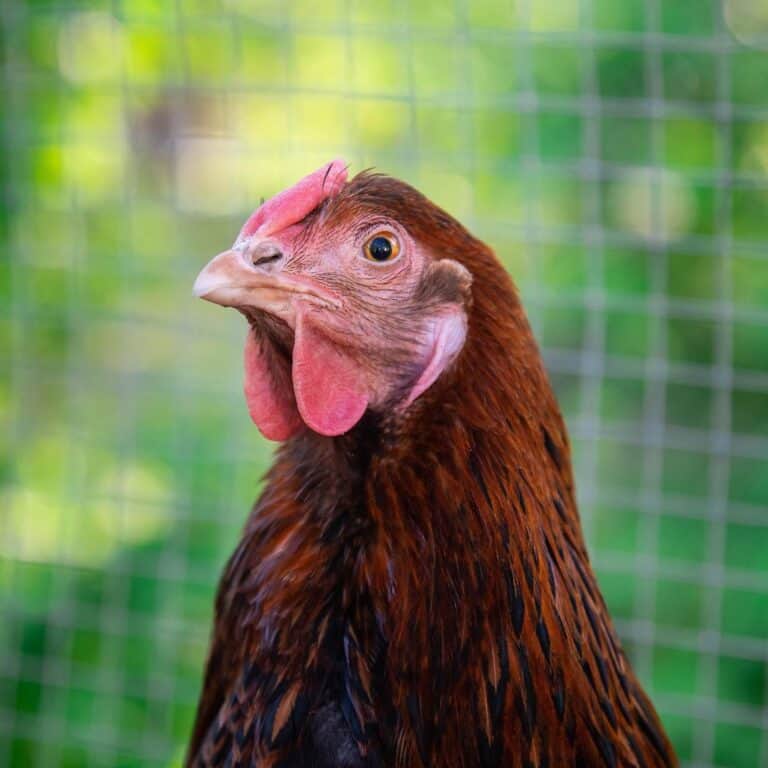
Before buying up a bunch of birds whether adults, biddies, or eggs; a lot of thought and research needs to be done on all types of birds before you can even think of starting to build coops and pens for them.
I found that it is best to focus on one breed at a time to allow you to learn the best way to care for them.
If you are planning to keep poultry as pets then these are your babies and you will want to give them the best care possible.
However, if you are raising these birds for food then you still need to remember that they will be going into your and your family’s bodies. You still want the best breeds for your needs. You would not give your human babies unhealthy food, so how could you do that to the chickens.
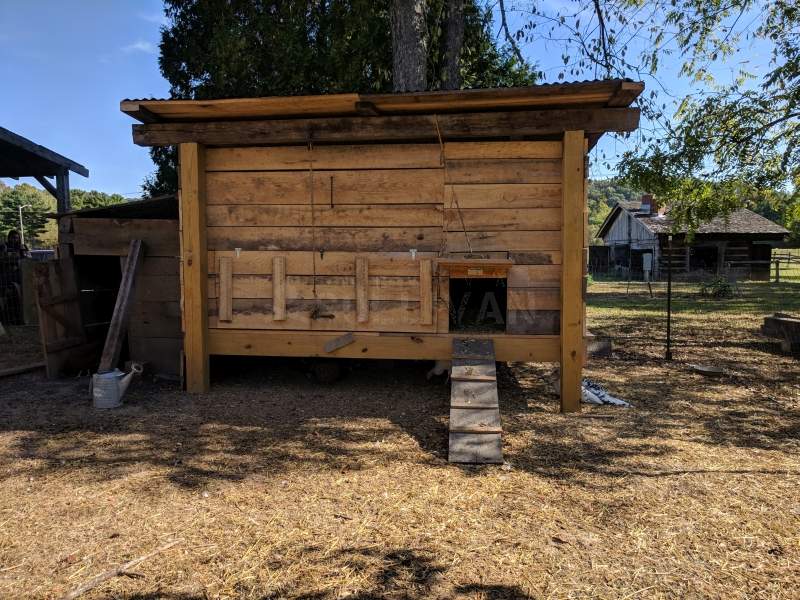
Table of Contents
Know What Predators Are in The Area
To start with you will need to know what predators there are in the area. Neighborhood dogs and cats, feral dogs or cats, bobcats, hawks, foxes, owls, raccoons, coyotes, and opossums are the more common predators.
Knowing what predator is most prone to attack, will allow you to create a more effective and efficient defense system. Many of the predators are highly intelligent, while others are simply opportunists. All can be discouraged by some easy backyard safety measures.
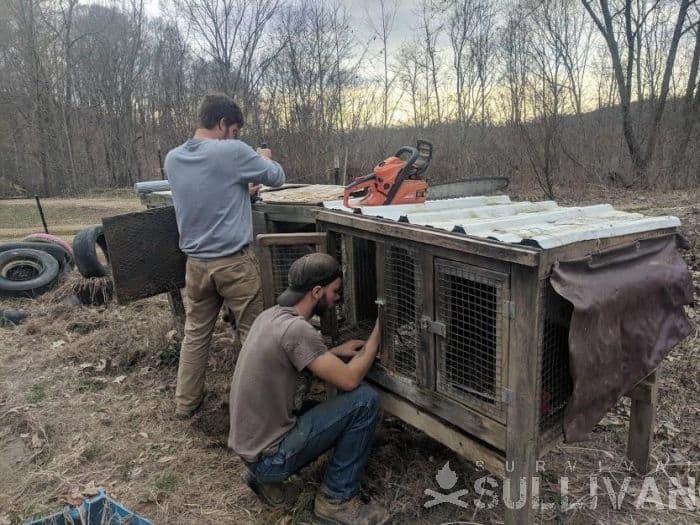
Caution: Many Predators are Protected Species
Even though you might be working overtime to deal with the predators, whatever they are, that are threatening or killing your chickens, you must keep in mind that many predators fall under protected species categorization.
In some cases, these predators may be protected under state or federal law, or both.
For example, many birds of prey are unilaterally protected at the state level, and many, like the bald eagle, are federally protected species.
Killing one can result in significant fines and serious jail time, and even trapping or “harassing” one could cost you a pretty penny. Similarly, many states have laws protecting such nuisances as the coyote and raccoon among other ground-bound predators.
As a result, it is important to be aware of the laws in your area before taking any “direct” action to protect your chickens from predators.
Decoys and scare tactics might be fine, but anything that could harm or kill a predator could open you up to fines or criminal charges. In some cases, it may be best to contact your state or local wildlife agency for advice on how to best protect your animals.
Defending the Coop
Protect your birds from various predators by beginning your process with the chicken coop. It doesn’t matter if you buy a ready-made coop or build one yourself, as long as it is sturdy and suits the needs of the chickens. You can do some simple techniques to make it safe for your birds.
Use Perimeter Alarms
One of the best ways to protect your chickens from predators is to set up some form of perimeter alarm system, either at the coop or run or at the edge of your property as appropriate.
These alarms can be as simple as a string of bells hung around the edge of your property or as sophisticated as an infrared sensor that triggers a loud siren or screecher. These systems have the added advantage of alerting you that something is making a move near your flock.
If you want a DIY option, some chicken keepers have had success using everything from jingle bells to rigged car horns to scare away predators, so get creative and see what works best in your situation. Just be sure not to use anything that could hurt the predator or your birds!
If DIY isn’t your thing or not worth your time there are a number of commercially available perimeter alarms that are specifically designed for wildlife detection, but most of them are only reliable against land-dwelling predators.
As always, the important thing is that the alarm be loud enough to startle or scare away predators and it be set up in such a way that false alarms are minimized.
And remember this: an alarm will only work to deter intelligent predators for so long. Without decisive follow-up action, they will soon adapt and ignore the loud alarm.
Dig a Rock-Filled Trench around Your Coop or Run
Another very effective way to keep quadruped predators out (or at least, to make it much harder for them to get in) is to dig a trench around the perimeter of your coop or run and fill it back in with large rocks and gravel.
This will effectively block most small predators, like weasels, from getting in while also slowing down and deterring larger predators like coyotes.
The rocks are heavier and harder to move than compacted dirt and are also harder on the paws and claws of these chicken thieves.
The longer and more painful it is for them, the more likely it is that they will give up. A 1 1/2 foot by 1 1/2 foot trench is all that is needed for most common predators.
However, If you live in an area with larger predators like black bears or larger coyotes, this trench should be at least 3 feet deep and the same width to make it a challenge. These bigger beasts are powerful, capable diggers and might not be discouraged except by serious resistance.
Buried Wire
If you are planning on building a run for your birds, it is imperative to know that several predators might try digging under it to get to your birds. It’s important to know that chickens are kept in and safe with hardware cloth; the predators are kept at bay through the hardware cloth.
A starving animal won’t stop until it is able to break through the flimsy chicken wire. So, it is best to use hardware cloth instead, dig down and bury it about 3 to 4 feet deep under the run.

Also, don’t forget to dig 8 to 12 inches around the run to place the hardware cloth (wire). These safety measures will keep the predators from being able to tunnel through to get to the underside of the run.
The same principles apply if you have chicken tractor. Ensure that the hardware cloth covers the floor to avert predators from tunneling their way into your chickens.
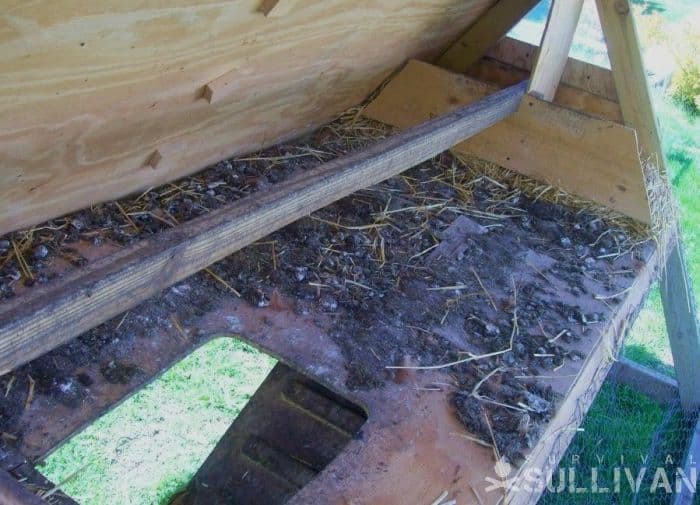
Note: The wiring can cause cuts to the birds’ feet, so make sure to check the feet often to keep them safe.
If raising ducks will call for a wading pool inside their pen. You can simple dig a hole and line it with plastic. Then run a water hose out to it.
The problem with this style is you would have to constantly clean it since it has no drain and ducks tend to drag food into the water. They also poop in the water.
Here is a good idea on creating a duck pool from a kid’s plastic wading pool.
Enclose the Coop
If the area you reside in has a large population of hawks, owls and other birds of prey, it’s necessary for you to put a top on your run and surround it and your coop with heavy wire fencing. Note that chicken wire is inadequate for stopping mammalian predators.
Chicken wire can be used, allowing your birds to still have visibility while stopping attacks from flying predators. Tarps can provide great shade and protection too.
Also consider the use of wide, high-contrast poultry netting to deter hawks from swooping in.
Increase Visibility
Keep the area around your run clean from debris or tall plants so you can see around it well. You obviously want to be able to see a predator before it attacks.
Block All the Access Holes
To ensure that there are no possible access holes, make sure to regularly check the enclosure, as the tiniest holes or gaps make it accessible for the predators to enter the coop. Pay particular attention to securing vents with sturdy, fine mesh.
Small predators, like rodents and weasels, are able to squeeze across a hole that measures only half an inch, which is something you certainly don’t want. Anywhere that their skull can fit, they can go.
Weasels kill for fun, and have been known to destroy a good-sized flock in just one night. So, check often for signs that a predator may be trying to find a way into the coop and strengthen those sections.
Lock Up at Night
It is vital that your coop’s doors are secured with latches every night. Make sure that you are using a latch with locking system that is not opened easily by clever critters.
Raccoons are infamously intelligent creatures and are known to be able to open the simplest of locks and bolts. Though most latches are not truly predator-proof, a good one will go a long way to saving your birds from night-time thievery.
A carabiner is a good lock to use because it requires the use of opposable thumbs. Use a padlock to further ensure that your coop is kept safe from the two-legged predator-man. Rare breeds are often stolen for their resale value, however, some will rob your hen house for eggs or meat.
This will start to happening all too often, causing unprepared neighbors to search for food. It might be a good idea to use three or four locks on the coop – two on the entrance door and another couple of locks on the coops pop door.
Check Biosecurity
Cleanliness is imperative to keep your birds healthy and safe. Every evening the pens should be cleaned of any leftover scraps of food.
Rats will be attracted to the food left in the feed troughs or flooring. They have been known to eat the biddies and their eggs. Once they have entered, they can wreak havoc to your birds, pens, and move into your home as well. Rats mainly come out at night, so if you’re seeing them during the day, it means the problem is huge and should be rectified immediately.
Note: Rats do not like the daylight, so only the lower hierarchical rats will risk a raid during the daytime.
Be Alert for Snakes
If you have rats lurking around, then it will not be long before you have snakes hanging around as well. Make sure to inspect the coop daily for these buggers. Rat, Corn and Black snakes will steal eggs and small chicks. Though snakes can help keep down the rat population, they are also able to be moved to another area.
Collect Eggs Daily
To keep predators away, collect the eggs daily to deter the temptation of stealing the eggs. Do this several times per day to make sure you have collected any eggs from late laying hens.
Add Motion Sensor Lighting
Many predators will attack only at night, one of them are raccoons. Having a bright light pop on will frighten away many would-be predators.
The motion sensor lights will activate when any motion around the coop is detected and the lights can be adapted with an alarm to alert you of a possible predator.
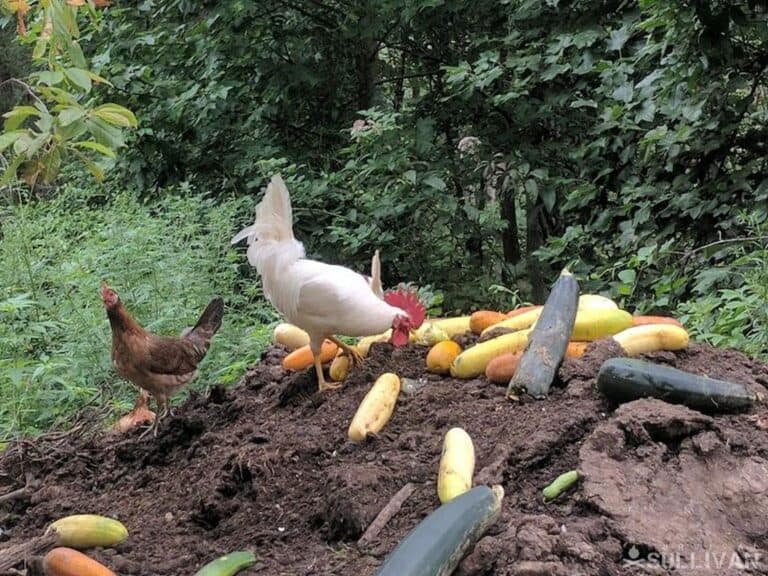
Free-Ranging Defense
While it is reasonably simple to safeguard a chicken run and coop, what can be done when you are raising free-range chickens? This is harder to do but it is feasible if you follow and implement what follows.
Hang Your Old CDs
For protection from preying birds (not a Klingon Destroyer either) hang up those old scratched up CDs or aluminum pie tins in the trees and bushes around your property.
When the sun rays hit the CDs, the reflection will scare off the any nearby preying birds.
Note: Avoid the use of mirrors, as they are likely to start a fire.
Use Electric Fences
Installing electric fences around the property will help to keep predators at bay as well. This type of fencing is inexpensive and simple to install, making the ideal choice for your homestead.
Install Safety Shelters
Preying birds can get very aggressive and attack all breeds with the intention of scaring them away, which is why you need to have a few safety shelters to allow your birds to hide in when under an attack.
Use a 55-gallon or larger capacity plastic drum and cut it lengthways, or you can even use a wood pallet set on top of cement blocks.
Use Owl Decoys against Birds of Prey
Another way to keep your chickens safe from flying predators is to set up owl decoys around your coop and run.
Hawks in particular are efficient, clever hunters and can take chickens right out of a coop or run in the blink of an eye. However, there is always a bigger fish, or rather bird!
Many owls are nocturnal predators of other birds of prey, and so the typical coop-raiding hawk is likely to be put off by the presence of an owl. An owl decoy is simply a life-size or larger replica of an owl, made from wood, plastic, or even metal.
There are many commercially available owl decoys on the market, and some even have lifelike head-turning or other movement features for greater fidelity.
Just be sure that it looks realistic enough to fool hawks and other birds of prey, and move it around periodically so predators don’t grow wise to the ruse.
This is one of the best “free-ranging” passive defenses you can use.
Try Using Scarecrows against all Predators
The second decoy option on our list is the good old-fashioned scarecrow. When it comes to truly apex predators, it is humanity that reigns supreme on land, and pretty much all other animals have learned to fear us. This includes the critters we want to keep away from our flock.
A well-made scarecrow is simply a human decoy, and is a time-tested and effective deterrent for a number of reasons.
First, they are usually highly visible, so predators will see them long before they get close enough to be an actual threat. Second, both flying and ground-dwelling animals will respect them, at least for a time.
As you might expect, the effect of a lazily made and placed scarecrow is only temporary when dealing with intelligent chicken predators.
Eventually, they will learn that that human figure is nothing to be afraid of. For this reason, it’s important to move your scarecrows around periodically so they don’t become “part of the scenery.”
Remember that realism is important for proper protection, and you should take pains to keep your scarecrow’s position changed, location moved and attire refreshed periodically.
Get Roosters
Roosters can cause a nuisance in the city or townships due to the early crowing. Some neighbors don’t like being woken up to the sound of a rooster calling the sun up when they have worked the night shift or had a rough night.
On the other hand, if you reside in the countryside, it’s generally fine. A decent rooster will defend his ladies with his life.
Note: Ensure that you have done enough research to find a breed of rooster that fits your needs.
Get a Few Black Chickens
One of the most interesting deterrents against birds of prey is one of the most elegant, too.
It sounds like folklore, but it is said that if you have a few black chickens in your flock, they will help protect the flock as a whole from hawks and other birds of prey.
I am happy to report that plenty of anecdotal evidence from chicken keepers and farmers suggests this is true!
The reason for this is that hawks have a long-standing enmity in nature with crows. Small flocks of crows are commonly observed attacking and hassling birds of prey, such as hawks, owls and even eagles.
While the motives behind these attacks are not fully understood, it is thought that crows may view these larger birds as a threat to their territory, nests or as competition for food.
Whatever the reason, these interactions can be quite spectacular, and more often than not the hawk or other predator gives up and flees!
Because most hawks are conditioned to be wary of crows, we can use this quirk against them. The jet black plumage of a few chickens in your flock might indicate “crows!” to any bird of prey preparing to strike, and accordingly might convince them to try their luck elsewhere.
Use Guard Dogs
Dogs can protect a larger area around the flock than a rooster; additionally, their scent can be extremely alarming to many predators.
This usually means the predator will not attempt to enter the area if they smell a dog in the vicinity. Before adding a dog to the mix make sure that they are properly trained or your dog can become a predator.
How to Keep Chickens Healthy
Chickens remain curious creatures and this can sometimes get them in trouble. Keeping the predators away is not enough, as sometimes the major threats have already entered your yard or garden. So, here are a few ideas to keep your place a safe haven for your flocks.
Avoid Toxic Chemicals
Chemicals used to kill weeds and insects in your yard and garden can be deadly to your flocks if they eat plants with this on it.
Keep the flocks away from areas that have been sprayed. Store the containers out of reach of your birds. If they accidentally get into any chemicals, call your veterinarian straight away.
Botulism
If you have never heard of Botulism before, it is a toxin that causes life-threatening poisoning.
If your homestead has a rat problem and you use poison to fix and hold the population of rodents, then be conscious that chickens will peck at the dead carcass and in turn be poisoned. Dispose of all dead animals that you find in a place that the chickens cannot access.
Botulism can also occur through dirty drinking water, especially caused by ducks. Try to keep the ducks’ ponds as clean as you can.
However, ducks will dirty up any drinking water you have set out because they like to get in the water. Ducks will poop in the water creating a very unhealthy habitat for all sorts of problems to occur. So, keep in mind the regular cleaning that will need to be performed with the ducks’ water.
Clean The Feeders
Use a little bleach to clean the water dishes and feeders clean on a weekly basis.
Bleach will kill a lot of germs and other nasty stuff growing in the feeders and water dishes. However, make sure to rinse the dishes well after using bleach on them. You can do the same method with the duck ponds that you have created for the flock of ducks.
Keep Their Feed Fresh
It is important that the feed is always fresh and not old and rotten. Make sure to store your GMO-free feed in waterproof and dry containers with a lid on it. Feed that has become old and moldy can kill your birds.
Regular Cleaning of the Coop
It is common knowledge that urine and poop can cause all sorts of health problems. Ammonia in high levels can cause respiratory issues and blindness in the birds.
A dirty coop will attract flies, which can create health problems within the flock too. Weekly cleaning can eliminate many health issues in your flock.
Health Checks Regularly
Ensure you do routine health checks on all your birds. Keep notice of your birds’ behaviors every day and make sure to include vent checks to keep up their health.
If the area around the vent becomes matted and clotted with poop it could lead to what is known as Flystrike; you will then need to give your birds a bath.
Add some warm water and some vinegar into a bucket. Allow the bird to sit in this solution to soak most of the matted section off. Then gently use a mild soap, such as Dawn Dish Soap, to clean the area.
Make sure to rinse all the soap off when you have thoroughly cleaned the vent area. Sometimes it is necessary to trim feathers around the area to help keep it from matting up again.
Conclusion
All the tips mentioned above will help keep your chickens safe and healthy. Ensure that you are watchful and clean in all aspects of dealing with your flocks of birds.
Make sure that you always have a steady supply of food if TEOTWAWKI happens so the consequence would be that they’ll live longer, so you can have fresh meat for a longer period of time.
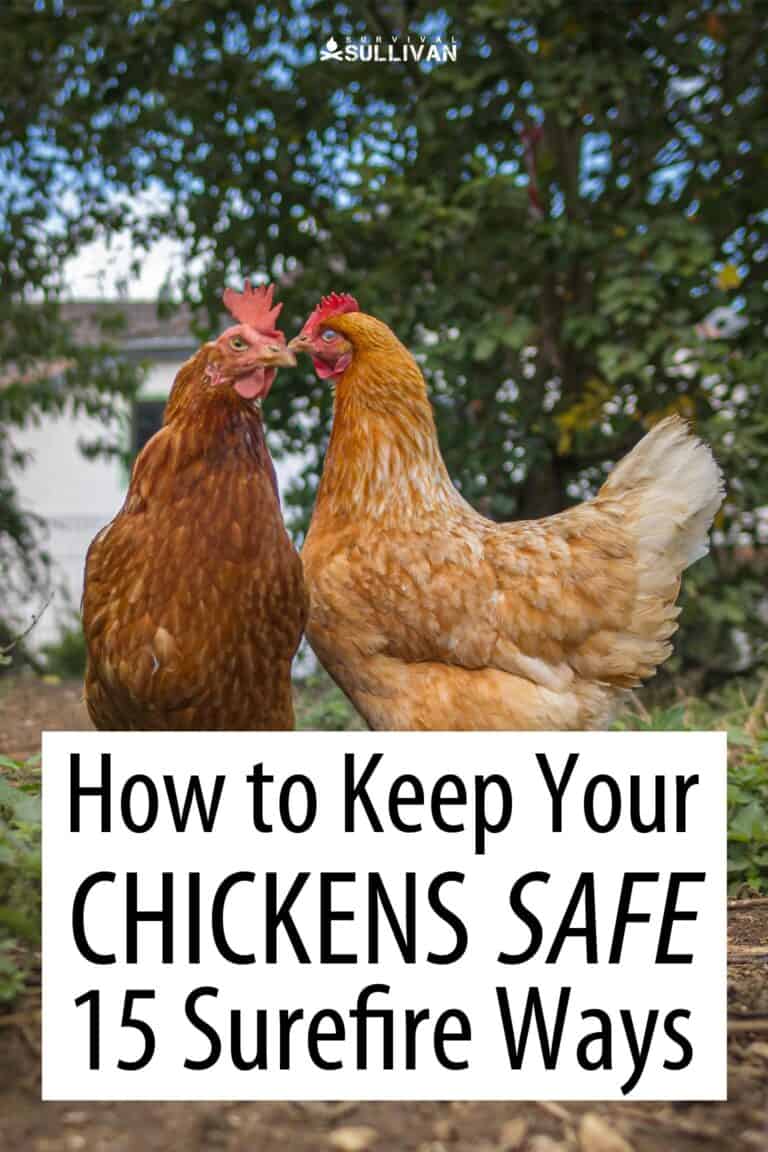

My name is Teresa Fikes. I am a Homesteader, survivalist, prepper, historian, and writer plus much more all in one package deal. I was raised on a small family farm were I was taught at an early age to survive off the land without the help of modern conveniences. I am a writer by profession and a Homesteader by Blood, Sweat, and Tears.
